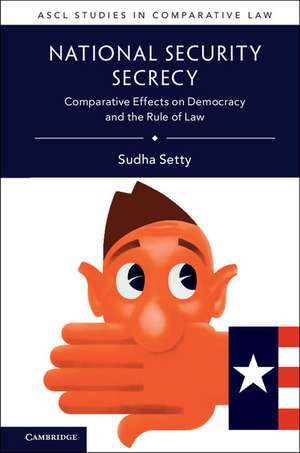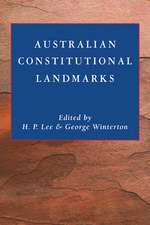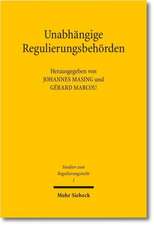National Security Secrecy: Comparative Effects on Democracy and the Rule of Law: ASCL Studies in Comparative Law
Autor Sudha Settyen Limba Engleză Paperback – 12 iul 2017
| Toate formatele și edițiile | Preț | Express |
|---|---|---|
| Paperback (1) | 265.62 lei 22-36 zile | |
| Cambridge University Press – 12 iul 2017 | 265.62 lei 22-36 zile | |
| Hardback (1) | 547.02 lei 43-57 zile | |
| Cambridge University Press – 12 iul 2017 | 547.02 lei 43-57 zile |
Preț: 265.62 lei
Nou
Puncte Express: 398
Preț estimativ în valută:
50.83€ • 53.20$ • 42.30£
50.83€ • 53.20$ • 42.30£
Carte disponibilă
Livrare economică 10-24 martie
Preluare comenzi: 021 569.72.76
Specificații
ISBN-13: 9781107576476
ISBN-10: 1107576474
Pagini: 244
Dimensiuni: 153 x 228 x 15 mm
Greutate: 0.35 kg
Editura: Cambridge University Press
Colecția Cambridge University Press
Seria ASCL Studies in Comparative Law
Locul publicării:New York, United States
ISBN-10: 1107576474
Pagini: 244
Dimensiuni: 153 x 228 x 15 mm
Greutate: 0.35 kg
Editura: Cambridge University Press
Colecția Cambridge University Press
Seria ASCL Studies in Comparative Law
Locul publicării:New York, United States
Cuprins
Introduction; Part I. The Infrastructure of Secrecy in the United States: 1. Executive branch secrecy; 2. Congressional complicity; 3. An overly deferential judiciary; Part II. Comparative Perspectives on Transparency: 4. International and supranational norms; 5. The United Kingdom; 6. India; Part III. Societal Tolerance for National Security Secrecy: 7. Public and political resilience; 8. Individual privacy and secrecy: a matter of contract or a human right?; Conclusion.
Recenzii
'An illuminating discussion of the costs of secrecy and how Congress and the Courts have condoned such an anti-democratic state of affairs. Its attention to how European courts and institutions have more vigourously challenged governmental claims of secrecy is exceptional.' Kent Roach, Professor of Law and Chair in Law and Public Policy, University of Toronto
'With insightful analysis, Sudha Setty demonstrates how the misuse of secrecy by governments in the United States and other countries has done serious damage to individual rights, democratic values, and the rule of law. We need to restore legislative and judicial checks on misleading executive assertions.' Louis Fisher, Scholar in Residence, The Constitution Project
'Sudha Setty writes with remarkable dexterity about the exponential increase in the powers of the state to remain secret while enhancing national security regimes in the war against terror. Setty gives a comprehensive account of how national security secrecy is enabled legally and politically in contemporary democracies at the expense of structural accountability, rule of law and fundamental rights.' Ujjwal Kumar Singh, University of Delhi
'With insightful analysis, Sudha Setty demonstrates how the misuse of secrecy by governments in the United States and other countries has done serious damage to individual rights, democratic values, and the rule of law. We need to restore legislative and judicial checks on misleading executive assertions.' Louis Fisher, Scholar in Residence, The Constitution Project
'Sudha Setty writes with remarkable dexterity about the exponential increase in the powers of the state to remain secret while enhancing national security regimes in the war against terror. Setty gives a comprehensive account of how national security secrecy is enabled legally and politically in contemporary democracies at the expense of structural accountability, rule of law and fundamental rights.' Ujjwal Kumar Singh, University of Delhi
Notă biografică
Descriere
This book considers how excessive national security secrecy undercuts democracy and the rule of law, necessitating comparative and critical analysis toward potential reforms.


























